Speaker 1: Good morning.
Speaker 2: Morning.
Speaker 1: Hi, how are you? Happy Monday. I'm going to quickly take attendance and then we're going to leave. I can't quite figure out how to turn this room into a circle, like with all the furniture so we can have a discussion, so we're going to go somewhere we can do that. Today is the first full day of class that I have with my students.
Okay, so grab all of your stuff, we're going to go find a place. That means I have this opportunity with my students to really think about how we are going to start this semester. On the floor, in a circle. This is perfect.
When I first started teaching, I really planned for the first day in an entirely different mindset that would've meant giving them a syllabus, giving them the rules of the classroom, the responsibilities that we have, all of those kinds of things, but over time I've realized I want them to walk away with an experience where they understand what learning is going to feel like in this space together. So, I've given myself this challenge to teach on the first day.
I am not going to give you a syllabus today. Instead, I'm going to ask you to tell me before you leave today, what you think this class is all about. Rather than me telling you, I'm going to have you tell me.
I say to them, these are your three clues. A quote, a candle, and this essay that we're going to read together. So, this quote is clue number one. Young people are not empty bottles to be filled, but candles to be lit. Will you turn to somebody close to you and just talk out loud about what do you, what do you think that means?
Speaker 3: I feel to be lit is like to be inspired, but being filled they're just teaching.
Speaker 4: It's about realizing your potential.
Speaker 1: In so many ways, this lesson is a lot like a template for what all kinds of lessons throughout this course are going to be like. On most days you're going to see that I'm starting with some kind of pathway into the more difficult work, so that's why a quote works really well because they can read that, they can turn and talk, they can start to unpack it and they start to access some prior knowledge. Talk to me about this quote. What do you think this quote's about?
Speaker 5: You're not there to give them information, but you're there to spark an interest in the world that you live within.
Speaker 1: So, do you remember what is the thing that you have to be able to do by the end of class today?
Speaker 6: What this class is about.
Speaker 1: You have to be able to tell me what this class is about. That's clue number one, this is clue number two, right on the table, clue number three is right in front of you. This is called allegory of the cave. It's kind of a tricky essay especially at the very beginning of a semester, so I'm going to read it out loud to you. We're going to go kind of slow, but you're going to want, and this is your copy, so you're going to want to kind of make some notes about it as we go.
On this first day, I've decided to read it out loud to them because I know that the tone and the inflection makes a huge difference in their ability to comprehend. We also know that students can comprehend text that's far more complex if it's read out loud to them so we're just going to read the first paragraph and then stop, but as I'm reading, I want you to try to picture, make a movie in your mind, of what's going on here. I'm walking them into it and I'm already talking within the first 10 minutes of this day about the habits of good readers because we need to also build stamina around really strong reading habits. And now I said, let me show in a figure how far our nature is enlightened or unenlightened.
As we progress through the essay, you're also going to notice that there are other strategies that we start to practice that we're going to want to use throughout the entire course. To them I said, the truth would be literally nothing but the shadows of the images. Okay, we're going to pause. This is a really good thing that readers do, especially when they're reading something new or something kind of tricky.
They read what we call a chunk, and then they just stop and they ask themselves, “Do I remember anything that I just read? Can I mark down? Can I underline and important phrase or sentence from what I just read?” Okay? So, we're going to practice that right now. So we're going to pause, ask yourself, do I remember anything, and then try to mark a phrase or a sentence that you think is really important. When you're ready, will you turn to somebody close to you just say, “This is what I marked and this is why I thought it was important.” There's not a right answer here, I promise you, or a wrong one either.
Speaker 7: I did number two, because it kind of explained the end of the objects which are being carried like a manner they would only [crosstalk 00:05:14]. Just kind of portraying it the way the prisoners would see it.
Speaker 1: In addition to wanting my students to have this experience, I also want them to understand that part of that experience is going to be complex work and Plato is perfect for complex work, but I also know that if I were just to say, “Go read this tough essay on your own and then tell me what this class is all about,” that it would be counterproductive. It really has to be a community effort because that's part of what I want them to understand about who we're going to be as learners. So what did you mark, what do you think is important? I'm really good at waiting and I'm super patient. Yeah Megan.
Megan: I marked when he was talking about how if another voice came along that they would fancy that. I think because they're just so used to repetition in their lives that if something new and unique came along that they would kind of be in awe because they've never seen anything like it.
Speaker 1: Absolutely, absolutely. That's nothing. Who has a different one? I know that the more we talk out loud about what our brains have to do as we're actually practicing this skill, the more likely students are to own that skill and then transfer it to other contexts.
Speaker 9: It says that he contemplates him as he is. You can kind of almost relate that's like real life. If you find out something that you're not supposed to know, it can totally change your perspective and your outlook on life and just completely change who you are as a person.
Speaker 1: I think my favorite part about the lesson today was any moment when a student took this allegory and connected it to their life. Do you want to start?
Speaker 10: Yeah, mine was whereas our argument shows that the power and capacity of learning exists in us already, so basically you don't need people to feed you information and tell you what to do. You already have a strive that's already inside you to do it.
Speaker 1: So very quickly for 30 seconds we're going to play the quick allegory game. I'm going to give you a piece of the allegory, you're going to tell me what it might represent. Prisoner. You just get to shout it out.
Speaker 11: Person.
Speaker 12: Human.
Speaker 11: Person, human. What about a chain?
Speaker 13: A restriction.
Speaker 1: A restriction. Yes. What about a cave? When I was listening to the conversations they were having, or maybe it was when I was doing the quick allegory association game, I could hear how Plato mattered today and that's what I hope for. I want them to know that they're connected to centuries of thinking and I think that's what today can do.
All right, so what do you think this class is all about? I've given you this quote and the candle and the essay. What do you think this class is all about? Okay, tell you what? I'm going to give you a chance to think about it, all right? So here is what I need you to do for tomorrow. I'm going to have you do a little bit of writing. I just want you to summarize what we read the best you can. Do you remember what always goes in a really effective summary? Textual evidence. Number two, I'm going to ask you to answer that question. What is this class all about?
You guys were awesome. I'll see you tomorrow, okay? Have you ever heard of the sandal game? You are going to love it. All right, you've got to stand up. When you contribute, you get to sit down. That's all there is to it. So, what are some things you remember about the essay that we read yesterday? Who's got something?
Speaker 14: They were talking about how they already had knowledge that existed in them so they wouldn't have to relearn anything, they would just already have it in them, kind of like the candle.
Speaker 1: Now maybe you could talk about connections that you made from the allegory to any other part of life. Stan?
Speaker 15: It shows how learning takes effort instead of just you're going to take effort to accept the fact instead of just turning away from it and going back to what you know.
Speaker 1: All right, so for those of you still standing, I'm gonna give you a new question. How do you think that helps us understand what this class might be about?
Speaker 16: I've thought of the quote and how ... life lighting the candles, kind of like building on the knowledge you already know instead of filling you up with new knowledge, just building on what you already know.
Speaker 1: When I think about my overarching goal of Leading with Learning instead of presenting a lesson, I think that this particular lesson really helps to achieve that because it creates an opportunity for us to do work together.
Speaker 17: My opinion is that the world-
Speaker 1: Students aren't sitting and getting. They are talking to each other, they're listening, they're writing, they're reading, they're doing so many of the skills that we know we're going to have to do throughout the entire course. That was really insightful. Holy cow, we're going to have a good semester.

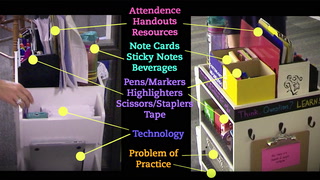
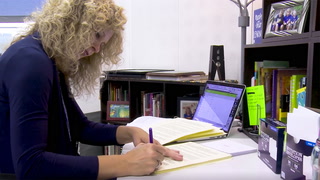
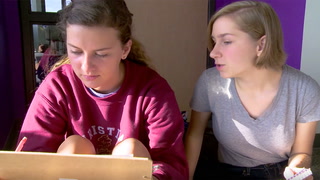
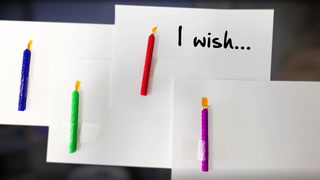
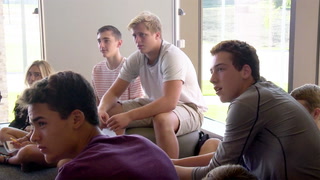
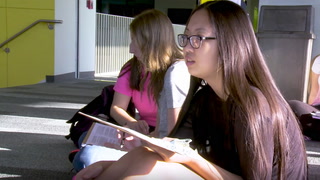
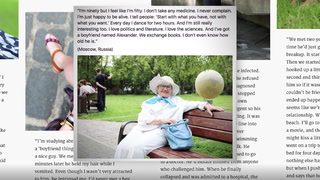
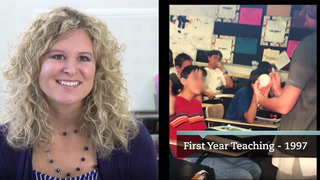









74 Comments
Tesha Foster Mar 27, 2024 5:30pm
Bakar Bey Mar 8, 2024 5:06pm
How have Ms. Wessling's first-day-of-school lessons changed over the years?
She changed from giving rules and a syllabus to giving students an experience to understand what the course with be like.
Why are students given three clues? What do the clues lead them to?
The clues are given to students to understand and express what the class will be like. She says it serves as a template.
How does Ms. Wessling want students to feel on the first day of school?
She wants students to feel like part of a community of learners.
Francesca Meuni... Dec 20, 2023 8:59pm
Stephanie Wray Nov 19, 2023 12:36pm
1. Ms Wessell wants to have a less rigorous day in the classroom on the first day, but still set those expectations. She took the students outside the classroom, and had them use critical thinking skills. She modeled and showed the kids how her class will be without having a strict routine.
2.The clues lead to class discussion,a dn shows the students how the class will be for the year. The clues have to be analyzed for them to solve the question.
3. She wants the students to have a voice, and make them feel like the are experienced and heard.
Patricia Perry Oct 23, 2023 12:36am
1. Ms. Wesling has changed her approach to how students learn over the years by no longer giving them a syllabus, rules and restrictions.
2. They are given three clues in order to work as a community and discuss and work together to figure out how these three clues will determine what the class is about.
3. On the first day of class she wants her students to feel empowered in learning and are leading the class with learning instead of a lesson. She wants her students to feel confident.